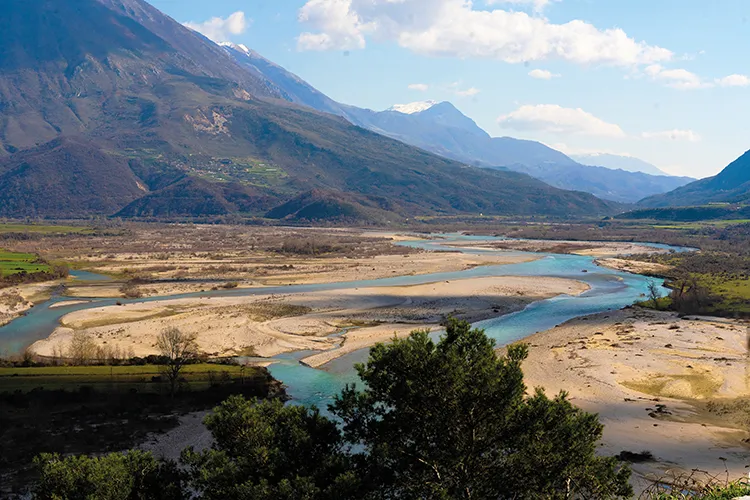
A landmark conservation success is under pressure as Albania’s Vjosa River faces fresh challenges from tourism development
One Saturday in April, residents from 36 villages of the Shushica Valley in southern Albania gathered to protest against the Himara Aqueduct project. Standing next to mounds of sky-blue pipes – evidence that operations to divert water from the Shushica River to the Adriatic coast for large-scale tourism demands are already underway – the group’s message was clear: ‘Don’t touch Shushica! Protect the Wild Vjosa River National Park!’
The Shushica is an important tributary of the Vjosa, the heart of Europe’s last wild river ecosystem. In January 2025, the International Union for the Conservation of Nature (IUCN) published a damning report concluding that the project to divert water would have severe impacts on the biodiversity of the Vjosa National Park – just two years after the park was established.
Unlike most European rivers, which have been heavily modified by dams and channelisation, the Vjosa flows uninterrupted for more than 270 kilometres from its source in the Pindos Mountains of Greece to the Adriatic Sea in Albania. Only about one-third of the world’s large rivers remain free-flowing, highlighting the exceptional rarity of the Vjosa River system, which is home to an astonishing array of flora and fauna – more than 1,100 species of animal and potentially more than 1,500 plant taxa. In particular, the relatively untouched nature of the Vjosa provides critical habitat for numerous endangered species, including the critically endangered Balkan lynx (with an estimated population of only around 40 in total, about ten in Albania), otters and the Egyptian vulture.

On 15 March 2023, the Albanian government declared the Vjosa River the first Wild River National Park in Europe – the culmination of years of tireless advocacy led by two individuals: Besjana Guri and Olsi Nika. This year’s recipients of the prestigious Goldman Environmental Prize, Guri and Nika have dedicated more than a decade to safeguarding the Vjosa. ‘We had our first public conference in 2014, when we announced our vision to declare the area a Wild River National Park, and to stop the development of dams along the Vjosa,’ recalls one of the award winners. ‘At the time that we started, there wasn’t much awareness. Nobody knew that the Vjosa is so special, that it’s one of the last free-flowing rivers in the whole of Europe.’
Their initial efforts met with strong opposition. ‘When we started, the general public was in favour of hydropower development. Hydropower was seen as a good thing at the time; it was seen as an opportunity for energy production – green energy production,’ says Guri. Nika explains that by the 2000s, however, Albania’s energy infrastructure was ‘totally outdated’. ‘Wrongly, the solution was always focused on how to generate more energy, rather than to improve the grid or improve energy efficiency.’
Undeterred, Guri and Nika, through their organisation EcoAlbania and in collaboration with international partners, embarked on a campaign of scientific research, public awareness and legal challenges. They documented the Vjosa’s ecological significance, highlighting its unique biodiversity and the crucial ecosystem services it provides, and presented compelling scientific evidence to policymakers, demonstrating the long-term economic and ecological advantages of a free-flowing river over short-sighted hydropower projects. In 2023, the government officially protected more than 20,000 hectares of river networks, encompassing the main Vjosa and its important tributaries: the Shushica, Drino and Bënça.

‘The establishment of a national park is a great achievement, and it’s a brand-new model of preserving nature in all its integrity, and not in small pieces,’ says Nika. ‘You can find other river national parks in other countries, but you can hardly find the entire river system being a national park, including the tributaries.’
However, the designation of the national park is not the end of the story. Various pressures continue to threaten the Vjosa’s integrity. Issues such as unsustainable gravel extraction, the threat of oil drilling, and now, the challenge of water diversion for tourism remain significant hurdles. Guri and Nika are actively collaborating with the Albanian government and local communities to address these issues, advocating for stronger enforcement of environmental regulations and sustainable development practices.
Enjoying this article? Check out some similar ones…
As of April 2025, a lawsuit filed by local residents and EcoAlbania against the Himara Aqueduct project is pending in the Administrative Court of Lushnje. If appeals are unsuccessful, about ten kilometres of the Shushica River, a vital artery of the Vjosa ecosystem, would be excluded from the park’s official boundaries, setting a dangerous precedent for future encroachments. Both Guri and Nika remain steadfast in their opposition to the project, understanding that the fight to protect the Vjosa is far from over. ‘Without undermining what has been achieved so far, the real challenge starts now,’ emphasises one of the laureates. ‘Our vision has always been not to have just a national park on paper, but to have a real national park and, of course, this will require a lot more work.’



